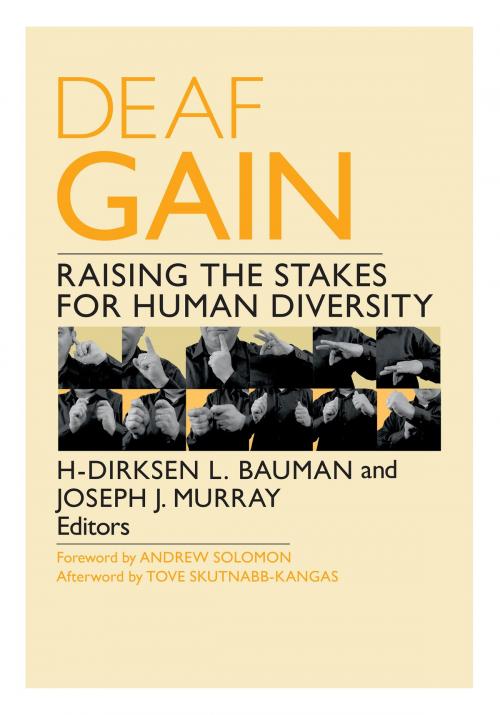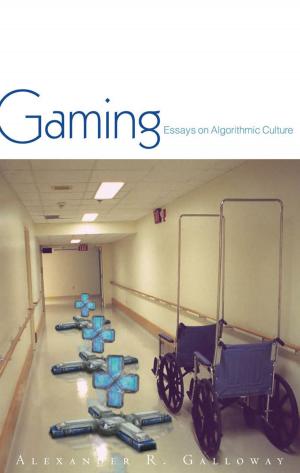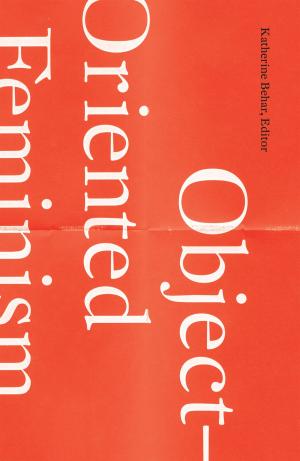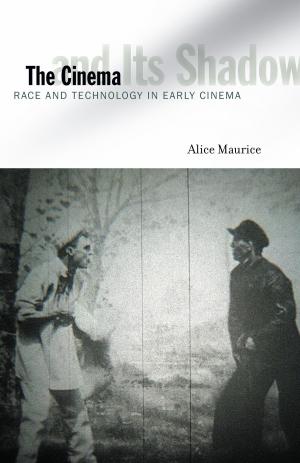Deaf Gain
Raising the Stakes for Human Diversity
Nonfiction, Social & Cultural Studies, Social Science, Disability, Anthropology, Reference & Language, Education & Teaching| Author: | ISBN: | 9781452942049 | |
| Publisher: | University of Minnesota Press | Publication: | October 15, 2014 |
| Imprint: | Univ Of Minnesota Press | Language: | English |
| Author: | |
| ISBN: | 9781452942049 |
| Publisher: | University of Minnesota Press |
| Publication: | October 15, 2014 |
| Imprint: | Univ Of Minnesota Press |
| Language: | English |
Deaf people are usually regarded by the hearing world as having a lack, as missing a sense. Yet a definition of deaf people based on hearing loss obscures a wealth of ways in which societies have benefited from the significant contributions of deaf people. In this bold intervention into ongoing debates about disability and what it means to be human, experts from a variety of disciplines—neuroscience, linguistics, bioethics, history, cultural studies, education, public policy, art, and architecture—advance the concept of Deaf Gain and challenge assumptions about what is normal.
Through their in-depth articulation of Deaf Gain, the editors and authors of this pathbreaking volume approach deafness as a distinct way of being in the world, one which opens up perceptions, perspectives, and insights that are less common to the majority of hearing persons. For example, deaf individuals tend to have unique capabilities in spatial and facial recognition, peripheral processing, and the detection of images. And users of sign language, which neuroscientists have shown to be biologically equivalent to speech, contribute toward a robust range of creative expression and understanding. By framing deafness in terms of its intellectual, creative, and cultural benefits, Deaf Gain recognizes physical and cognitive difference as a vital aspect of human diversity.
Contributors: David Armstrong; Benjamin Bahan, Gallaudet U; Hansel Bauman, Gallaudet U; John D. Bonvillian, U of Virginia; Alison Bryan; Teresa Blankmeyer Burke, Gallaudet U; Cindee Calton; Debra Cole; Matthew Dye, U of Illinois at Urbana–Champaign; Steve Emery; Ofelia García, CUNY; Peter C. Hauser, Rochester Institute of Technology; Geo Kartheiser; Caroline Kobek Pezzarossi; Christopher Krentz, U of Virginia; Annelies Kusters; Irene W. Leigh, Gallaudet U; Elizabeth M. Lockwood, U of Arizona; Summer Loeffler; Mara Lúcia Massuti, Instituto Federal de Santa Catarina, Brazil; Donna A. Morere, Gallaudet U; Kati Morton; Ronice Müller de Quadros, U Federal de Santa Catarina, Brazil; Donna Jo Napoli, Swarthmore College; Jennifer Nelson, Gallaudet U; Laura-Ann Petitto, Gallaudet U; Suvi Pylvänen, Kymenlaakso U of Applied Sciences; Antti Raike, Aalto U; Päivi Rainò, U of Applied Sciences Humak; Katherine D. Rogers; Clara Sherley-Appel; Kristin Snoddon, U of Alberta; Karin Strobel, U Federal de Santa Catarina, Brazil; Hilary Sutherland; Rachel Sutton-Spence, U of Bristol, England; James Tabery, U of Utah; Jennifer Grinder Witteborg; Mark Zaurov.
Deaf people are usually regarded by the hearing world as having a lack, as missing a sense. Yet a definition of deaf people based on hearing loss obscures a wealth of ways in which societies have benefited from the significant contributions of deaf people. In this bold intervention into ongoing debates about disability and what it means to be human, experts from a variety of disciplines—neuroscience, linguistics, bioethics, history, cultural studies, education, public policy, art, and architecture—advance the concept of Deaf Gain and challenge assumptions about what is normal.
Through their in-depth articulation of Deaf Gain, the editors and authors of this pathbreaking volume approach deafness as a distinct way of being in the world, one which opens up perceptions, perspectives, and insights that are less common to the majority of hearing persons. For example, deaf individuals tend to have unique capabilities in spatial and facial recognition, peripheral processing, and the detection of images. And users of sign language, which neuroscientists have shown to be biologically equivalent to speech, contribute toward a robust range of creative expression and understanding. By framing deafness in terms of its intellectual, creative, and cultural benefits, Deaf Gain recognizes physical and cognitive difference as a vital aspect of human diversity.
Contributors: David Armstrong; Benjamin Bahan, Gallaudet U; Hansel Bauman, Gallaudet U; John D. Bonvillian, U of Virginia; Alison Bryan; Teresa Blankmeyer Burke, Gallaudet U; Cindee Calton; Debra Cole; Matthew Dye, U of Illinois at Urbana–Champaign; Steve Emery; Ofelia García, CUNY; Peter C. Hauser, Rochester Institute of Technology; Geo Kartheiser; Caroline Kobek Pezzarossi; Christopher Krentz, U of Virginia; Annelies Kusters; Irene W. Leigh, Gallaudet U; Elizabeth M. Lockwood, U of Arizona; Summer Loeffler; Mara Lúcia Massuti, Instituto Federal de Santa Catarina, Brazil; Donna A. Morere, Gallaudet U; Kati Morton; Ronice Müller de Quadros, U Federal de Santa Catarina, Brazil; Donna Jo Napoli, Swarthmore College; Jennifer Nelson, Gallaudet U; Laura-Ann Petitto, Gallaudet U; Suvi Pylvänen, Kymenlaakso U of Applied Sciences; Antti Raike, Aalto U; Päivi Rainò, U of Applied Sciences Humak; Katherine D. Rogers; Clara Sherley-Appel; Kristin Snoddon, U of Alberta; Karin Strobel, U Federal de Santa Catarina, Brazil; Hilary Sutherland; Rachel Sutton-Spence, U of Bristol, England; James Tabery, U of Utah; Jennifer Grinder Witteborg; Mark Zaurov.















